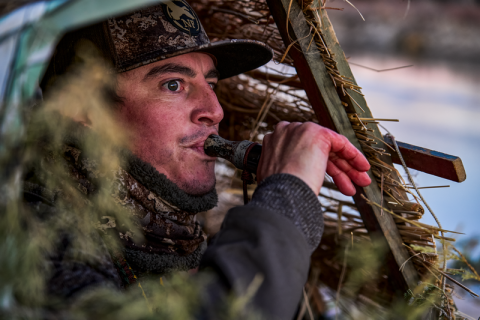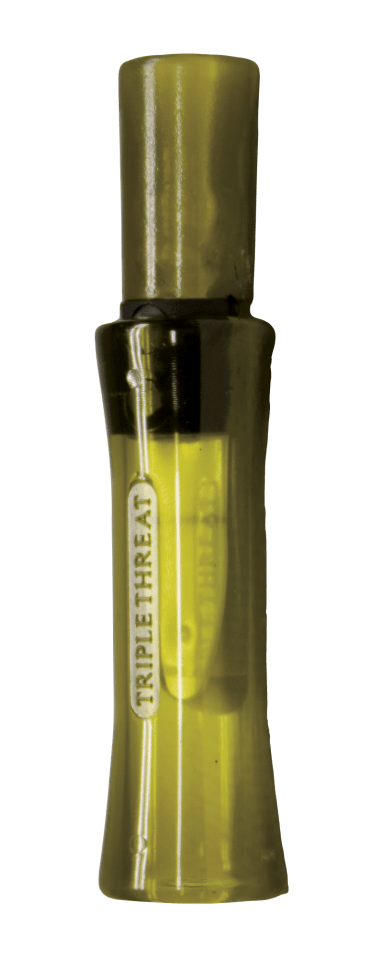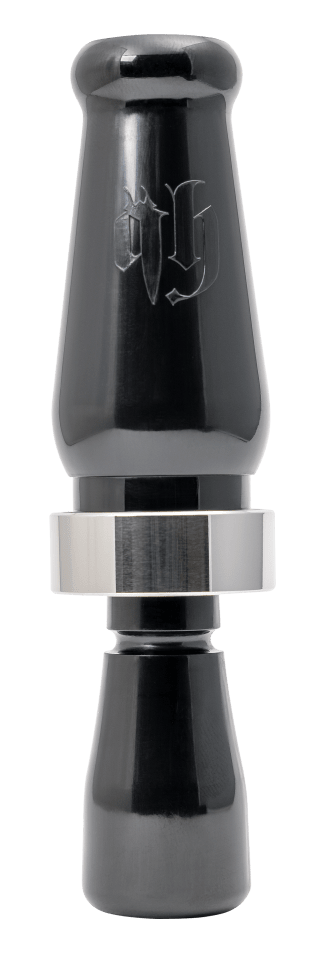
Choosing the right duck call can make a big difference in your hunting success. As a seasoned duck hunter, I've found that the right call can mean the difference between a great hunt and going home empty-handed. Here's a friendly guide to help you choose the perfect duck call.
Type of Duck Call
The type of duck call you choose will greatly affect your success. Single reed calls are very versatile and can make a wide range of sounds. However, they can be tricky for beginners. If you're just starting out, a double reed call might be easier to use. These calls produce a consistent, realistic duck sound, though they offer less versatility than single reeds. There's also the triple reed call, which combines ease of use with a unique sound, giving you a bit of both worlds.
Single Reed Calls
Zink Calls Power Hen Polycarbonate Duck Call - Smoke
The Zink® Calls Power Hen™ Polycarbonate Duck Call is for hardcore duck hunters with power on the top end and soft feeding calls on the low end. Pure realism; hand-built and hand-tuned. Single reed.
Shop Now- Description: These calls have one vibrating reed that makes the sound.
- Pros: Very versatile and can produce many different sounds.
- Cons: Can be hard for beginners to use.
- Best For: Experienced hunters or those willing to practice a lot.
Double Reed Calls
737 Duck Calls Dos Pure Hunter Acrylic Duck Call - White/Black/Black
A consistent performer based on 737's popular "No. 1" design, the Dos Pure Hunter Acrylic Duck Call from 737 Duck Calls gives waterfowlers a pure hunting sound. Built to offer more forgiveness on the hunt, this double-reed call features the same professionally-tuned, custom cut reeds and hand-sanded tone board as 737's other calls.
Shop Now- Description: These calls have two reeds that work together to make the sound.
- Pros: Easier for beginners and produce a consistent, realistic sound.
- Cons: Less versatile than single reed calls.
- Best For: Beginners or those who want a straightforward call.
Triple Reed Calls
Duck Commander Triple Threat Duck Call
Patented 3-reed design is ''pure duck'' with a little extra kick-the Duck Commander® Triple Threat Duck Call easily replicates the quack, feed call, and hail call of a mallard hen.
Shop Now- Description: These calls have three reeds, making the sound more complex.
- Pros: Easy to use and offer some versatility.
- Cons: Less common and can be harder to find.
- Best For: Hunters looking for a unique sound that's easy to use.
Material
The material of your duck call affects its sound, durability, and maintenance. Wooden calls offer a warm, natural sound but need more care because they can be affected by moisture. Acrylic calls are very durable and produce a loud, sharp sound, making them ideal for open water hunting. Polycarbonate calls offer a balance between quality and affordability. They are durable and provide good sound quality without breaking the bank.
Wood
Echo Calls Timber Duck Call - Cocobolo
Specially designed for close-in calling, the Echo Calls Timber Duck Call delivers a sound as pretty as its wood construction. The Timber gives duck hunters the power and versatility of a single reed call in a sweet sounding timber call to help them deliver calls ducks simply can't resist.
Shop Now- Description: Known for natural, warm tones.
- Pros: Produces a rich, mellow sound and looks nice.
- Cons: Can be affected by moisture and needs regular maintenance.
- Best For: Hunters who prioritize sound quality and are willing to invest time in maintenance.
Acrylic
Rich-N-Tone Mondo S Duck Call - Boots On
A short barrel take on RNT's proven DC Mondo sound, the Rich-N-Tone™ Mondo S Duck Call gives duck hunters the southern Mondo sound they like with a little higher pitch. Hearkening back to the days duck hunters would simply saw off a section of a call's barrel to get the sound they were looking for, the Mondo S shortens the standard Mondo barrel a full 3/4".
Shop Now- Description: Made from a type of plastic known for its clarity and durability.
- Pros: Produces a loud, sharp sound and is very durable.
- Cons: More expensive and some hunters feel the sound is less "natural."
- Best For: Hunters who need a durable, high-performing call.
Polycarbonate
QuackHead Original Duck Call
A true all-purpose duck call for your lanyard, the dependable QuackHead Original Duck Call helps duck hunters deliver a wide range of calls in the field. Made to produce soft, low, loud, and raspy sound, this versatile, single-reed design helps callers crank out everything from loud ringing hail calls to soft and sexy "put the landing gear down" calls. Polycarbonate construction.
Shop Now- Description: Another type of plastic, balancing affordability and performance.
- Pros: Good quality sound, durable, and affordable.
- Cons: May not have the same tonal richness as wood or the sharpness of acrylic.
- Best For: Hunters looking for a reliable, budget-friendly option.
Sound
Sound is a crucial factor in selecting a duck call. Consider the volume you need based on your hunting environment. If you're hunting in open water, a louder call will help you reach distant ducks. For timber and smaller bodies of water, a softer call is better. Think about the tone and range of the call, too. You want a call that can produce various sounds, from loud highballs to softer feeding chuckles.
Tone
- Naturalness: A good tone should mimic real duck sounds.
- Environment: Softer tones work best in wooded areas; louder tones are better for open water.
- Species: Some calls are designed to imitate specific species.
Range
- Versatility: A call with a broad range lets you adapt to different hunting situations. You might need a loud highball to catch the interest of distant ducks and softer feeding chuckles as they get closer.
- Skill Level: Single reed calls offer a broader range but can be harder to master. Double reed calls are easier for beginners.
- Adaptability: A call with a good range allows you to switch between different sounds based on the ducks’ behavior.
Whenever possible, test different calls to see which one produces the tone and range that works best for you. Regular practice will also help you get the most out of your chosen call, ensuring you can effectively produce the sounds needed in various hunting scenarios.
Ease of Use
Ease of use is particularly important if you’re new to duck hunting. Beginners might find double reed calls easier to use, while more experienced hunters might prefer the versatility of single reeds. Also, consider the maintenance required. Wooden calls may need more care due to their sensitivity to moisture, whereas acrylic and polycarbonate calls are generally more low-maintenance.
Customization and Tuning
Some duck calls offer the option for customization and tuning. This allows you to adjust the call to better suit your style or specific hunting conditions. Whether you’re tweaking the reed placement or adjusting the tone board, a tunable call can be a valuable tool in your hunting arsenal.
How many duck calls do you need?
When heading out on a duck hunt, it’s generally wise to carry at least three types of duck calls: a versatile all-purpose call, a specialty call, and a backup call. The versatile call, often a single or double reed, covers a wide range of sounds for various situations. A specialty call, like a whistle or feeding chuckle, is useful for specific conditions or targeting particular species. Finally, a backup call ensures you're prepared in case your primary call fails or gets lost. This setup provides flexibility and reliability, helping you adapt to different hunting environments and scenarios effectively.
Additional Considerations
- Weather Conditions: Make sure your duck call can handle different weather conditions, especially if you hunt in extreme climates.
- Hunting Location: Choose a call that matches your hunting environment—open water, marshes, or timber.
- Brand Reputation: Look for brands that have good reviews and are trusted by other hunters.
- Price Range: Balance your budget with quality. Sometimes spending a bit more gets you a better-performing and longer-lasting call.
- Practice Time: Commit to practicing regularly. Even the best call won’t help if you’re not skilled at using it.
- Warranty and Support: Check if the call comes with a warranty or customer support, which can be helpful for troubleshooting or replacements.
- Portability: Consider the size and weight of the call, especially for long hunting trips.
- Lanyard Compatibility: Make sure the call can be securely attached to a lanyard for quick access.
- Noise Levels: Be aware of the noise the call makes when handled, as some materials can be noisier than others.
- Community Feedback: Join hunting forums and communities for real-world insights and recommendations.
Additional Content:
- 3063 views







